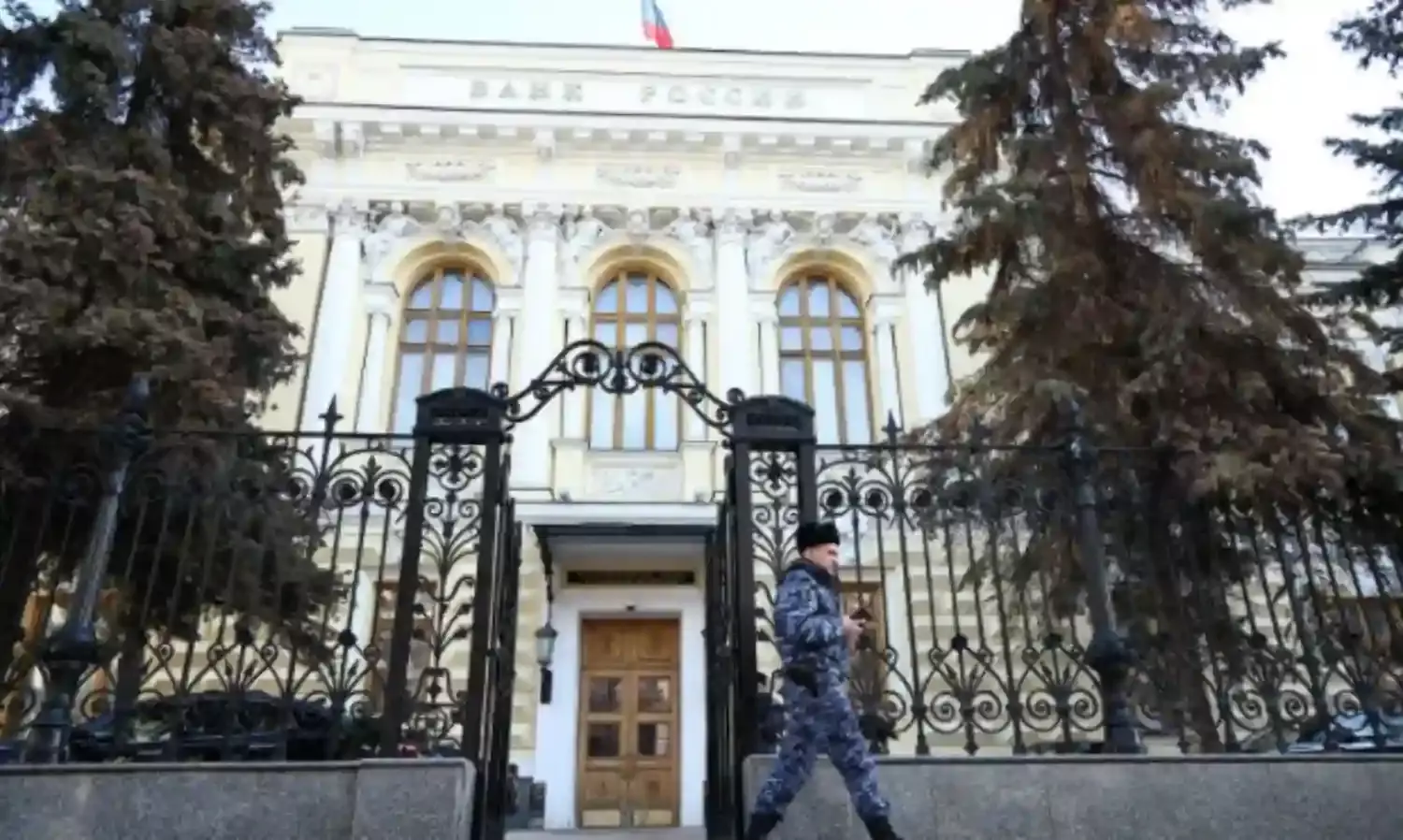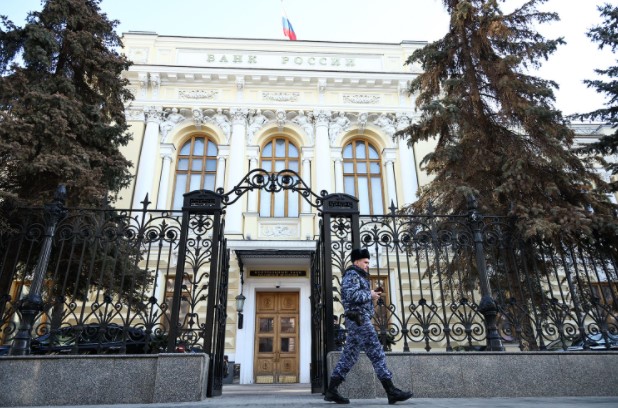Russia Adjusts to ‘Sanctions From Hell’
Russia’s Central Bank under western sanctions

The Russian President Vladimir Putin’s remarks at his meeting with government ministers on Thursday constituted his first comments on the West’s “sanctions from hell.” They were focused almost entirely on “a set of measures to minimise the consequences of sanctions on the Russian economy and the people of our country.”
Putin’s number one priority is to hold himself accountable to his people. Unlike his American counterpart, Joe Biden, Putin feels no need of grandstanding, given his high approval rating above 70%.
The paradox is, while the western countries who imposed the sanctions are going through paroxysms of angst, gnawing worries and anxiety syndromes, the “victim”, Russia, seems nonchalant and is calmly adjusting to the “new normal.” The contrast couldn’t be sharper.
Without doubt, the Kremlin prepared thoroughly for the western sanctions. Prime Minister Mikhail Mishustin told Putin that a “special headquarters” has swung into action to coordinate the activities of all departments, including at the regional level. He said, “Steps to protect the most vulnerable areas are being worked through sector by sector.” The “core goals” are:
- “protecting the domestic market”;
- ensuring uninterrupted functioning of enterprises by eliminating disruptions in logistics and production chains;
- helping the people and businesses to quickly adapt to the changing circumstances; and,
- maintaining employment.
Over 20 major legislations are in the pipeline, which include specific proposals for stabilising financial markets, support industries, especially for the private sector, as well as for the “return of capital.”
One draft law aims to prevent shutdown of factories by foreign owners through “external management.” There is a vague hint of nationalisation, if push comes to shove. Interestingly, most western owners are announcing “temporary suspension of operations” while paying salaries to employees.
The IT sector, construction industry, transport companies and travel and tourism sector will receive special attention — as also agriculture, which is not only about jobs but also food security. There is an overall relaxation of regulatory measures, debt repayment schedules, bureaucratic procedure, etc.
Mishustin noted: “Maximum freedom of economic activity in the country, minimal regulation and control and, of course, support for the labour market will remain the basis for our economic response. The Government will expand import substitution and help domestic producers replace foreign products in supply chains.”
The highlight of yesterday’s event was the presentation by Finance Minister Anton Siluanov on measures to stabilise the domestic financial market, underscoring how accurately the Kremlin anticipated the West’s agenda to isolate Russia.
Siluanov said, “the Western countries have basically launched a financial and economic war” combining a default on their financial liabilities to Russia with a freeze on Russia’s gold and currency reserves. “They are doing all they can to stop foreign trade and the export,” he added, “trying to create a shortage of imported everyday essentials… (and) compel successful businesses with foreign capital to shut down.”
In these circumstances, the government’s “priority is to stabilise the situation in the financial system and ensure uninterrupted operations.” Siluanov explained that the measures taken in this direction include “precautions to control the outflow of capital abroad” and a special procedure for servicing external debt, including national debt, whereby Russia will pay off its external liabilities in rubles and “carry out the conversion by de-freezing our gold and currency reserves.”
Other measures include mandatory surrender of foreign exchange proceeds by companies, higher ruble interest rates, suspension of taxes on individual interest income for two years, suspended VAT on the purchase of gold and “a large project on capital amnesty.”
The central bank will fully guarantee the liquidity and uninterrupted operations of financial institutions. Siluanov claimed, “These measures have already produced results. The situation on the outflow of deposits is being stabilised and the amount of cash withdrawals has been reduced to almost zero… balance of payments is also improving. Current account receipts are balancing out capital flow.”
To be sure, the big increase in oil and gas revenue will offset any decline in revenue in other sectors, thereby reduce borrowing and public debt, and will provide funds for priority spending.
Most important, Siluanov stressed that the government regards the social commitments as the “top budget priority.” He said, “We will ensure the payment of pensions, benefits, salaries and other payments in a timely manner and in full. Medicines are provided as planned as well, including for children with complex diseases..
“In May, low-income families with children will start receiving new payments. We will earmark additional spending for these purposes in the budget system. The Government has begun to implement anti-crisis measures. Our top priority is to maintain employment and jobs, and to support people who need help under the current circumstances.”
All in all, the prognosis here rubbishes the western predictions of “apocalypse now”. The EU’s rejection of Washington’s proposal for sanctions on Russia’s oil exports virtually ensures that there isn’t going to be any income deficit in Moscow. In 2021, the Kremlin balanced its budget with an oil price expectation of $45 per barrel. The prices currently exceed $130 per barrel!
This conservative fiscal approach by the government largely insulates the economy from the effects of Western economic sanctions. Ironically, the pressure is going to be on European leaders who are concerned about major energy supply disruptions from Russia and have to keep their economies supplied with fuel, while also punish Russia!
On the contrary, if Putin responds with gas cutoffs, that could spike energy prices further, drive inflation, and undermine Europe’s economic recovery. Simply put, Russia is much larger than the contiguous United States, and has an educated population and far more natural wealth than the West’s Russophobes might expect!
Take Russia’s exclusion from SWIFT. The fact of the matter is that while seven Russian banks were removed from SWIFT, those targeted did not include Sberbank or Gazprombank, two of Russia’s largest banks by assets. Why? Primarily due to Europe’s continued reliance on Russia for energy!
The point is, Russia is intricately connected to the global economy, holds large quantities of critical resources, and has been strategically preparing since 2014 to weather the long-term impacts of sanctions and a removal from SWIFT.
Furthermore, it needs to be understood that while several Russian banks are now cut off from SWIFT, they can still execute international transactions with other banks — except that they must use slower and less-secure methods of interbank communication, such as the outdated telex telegram network or phone calls and email.
By the way, Russia has also developed its own internal financial transaction messaging system, the System for Transfer of Financial Messages that could at a pinch serve as a functional alternative to SWIFT.
Equally, the western sanctions against Russia are bound to cause ripple effects across global markets, including supply chain disruptions and higher prices on energy and agricultural goods. Apart from being a key exporter of oil and gas, Russia is the world’s largest producer of palladium and the second-largest producer of platinum—key commodities used in semiconductor manufacturing—and a major exporter of other critical minerals, mining commodities, and agricultural goods.
Clearly, Russia has no dearth of willing trade partners across Asia, Africa, and the Middle East, as it comes under compulsion to rely primarily on non-Western-aligned nations for trade markets for the foreseeable future.
This has larger implications. Western sanctions could potentially accelerate a global economic divide between the West and Russian-aligned economies that are open to break away from the current US-dominated financial system, thereby accelerating a broad global economic reorientation.
Surely, sanctions will isolate Russia from the US and EU markets, but its large reserve of natural resources and strong ties to China decrease the likelihood that it will become economically isolated.
On the contrary, if Western sanctions persist, economic relations with Russia could help accelerate the growth of a non-Western bloc in the global economy, which would have deleterious impact on the status of the American dollar as the world currency.
Quite obviously, there are already incipient signs that thoughtful minds in Europe, especially France and Germany, feel troubled and are conscious of the need to rebuild bridges with Russia. How they pan out remains to be seen.
The likelihood is that once Russia has had its way as regards its security guarantees, a process of rapprochement will commence between the major European countries and Russia. In fact, at yesterday’s meeting, Putin expressed confidence that he expects a volte-face even by the US, just as the Biden administration has done vis-a-vis Venezuela and Iran recently.
The EU foreign policy chief Josep Borrell, a hawkish figure on Russia, made an abject confession on Thursday when he said EU has used up all of the possible restrictive measures against Russia: “Of course, one can always go further, but we have already reached the limits of what we can do. We have done everything we could.” Of course, Putin reserves his option to retaliate against Western sanctions at a time of his choosing and selectively. Presently, his focus is on navigating the Russian economy through the “sanctions from hell.”
Ambassador M.K.BHADRAKUMAR is retired from the Indian Foreign Service.




